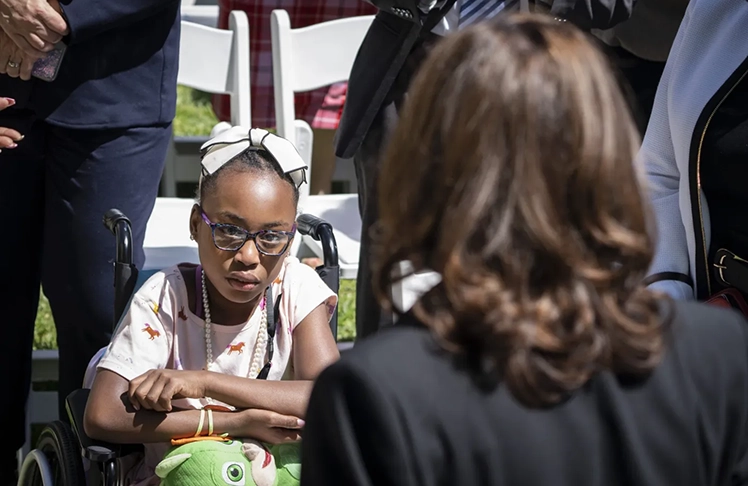
This article is one of a series of articles produced by Word in Black through support provided by the Chan Zuckerberg Initiative. Word In Black is a collaborative of 10 Black-owned media outlets across the country.
As Kamala Harris prepares to formally accept her party’s presidential nomination at the Democratic National Convention on August 19, voters will want to hear about her vision for improving public education.
Known for her advocacy for universal preschool, significant teacher pay raises, and initiatives aimed at diversity and inclusion, a Harris administration could adopt an educational platform that positively impacts Black students. In addition, given Gov. Tim Walz’s support for progressive, equitable education policies in Minnesota, Harris’ selection of him as her running mate could also be a sign that she’ll champion support for public schools.
Why Her Education Agenda Matters to Black K-12 Students
Black students face significant educational disparities due to systemic racism, underfunding of schools in Black communities, and discriminatory systems. Harris’s education agenda could help address these inequities by focusing on increased funding and ensuring that schools serving predominantly Black communities have the resources to provide a high-quality education.

Educational Track Record As Senator
Before becoming vice president in 2021, Harris served as the junior U.S. senator from California from 2017-2021. The education policies she supported intended to provide students equitable educational opportunities and prepare them for college and future careers. Two of the four education-related bills she backed were directly related to K-12 schools:
- The Family Friendly Schools Act would have directed the Department of Education to provide grants to local school districts to support aligning the school day with family work schedules and building stronger relationships between families and school districts.
- The 21st Century STEM for Girls and Underrepresented Minorities Act would have directed the Department of Education to fund school districts to cover the costs of STEM education activities for girls and children from underrepresented racial and ethnic minority backgrounds.
Harris also cosponsored the Strength in Diversity Act, which would have promoted school diversity initiatives, including busing. However, the Republican-controlled Senate blocked passage of these bills under former President Donald Trump’s tenure.
The 2020 Presidential Campaign
In 2020, Harris ran for president but lost the nomination to Joe Biden. However, during her campaign, she advocated for universal preschool and free college and called for a $13,500 raise for every teacher by the end of her first term. She also criticized conservative politicians for “attacking” public schools and teachers during the pandemic.
Given those advocacy and legislative efforts, here’s what Harris’ education policy agenda could potentially look like as president:
Universal Preschool
I am running to declare education is a fundamental right, and we will guarantee that right with universal pre-K and debt-free college.KAMALA HARRIS, JANUARY 2019
Harris could advocate for nationwide access to free preschool for all children. This would level the educational playing field from an early age by allowing all children to start their education earlier, which research shows can lead to better long-term academic performance.
Increased Funding for Title I Schools
We must strive for a more equitable public education system that will lead to better school and life outcomes for all children. – KAMALA HARRIS, OCTOBER 2019
Harris has advocated for more significant investment in Title I schools, which serve low-income communities and often have high percentages of Black students. As president, she could prioritize increasing funding for Title I schools — providing resources needed for smaller class sizes, advanced technology, updated textbooks, and extracurricular programs. This could also fund services such as school counselors and nurses, as well as after-school programs, which are crucial for addressing the needs of students in underserved communities.
Teacher Pay Raises
You can judge a society by the way it treats its children, and one of the greatest expressions of love that a society can give to its children is educating those children with resources they need. – KAMALA HARRIS, MARCH 2019
Harris has previously supported substantial increases in teacher salaries. As president, she could push for federal funding or incentives for states to boost pay for K-12 teachers. This move could attract more qualified individuals to the teaching profession and improve teacher retention rates, which could enhance the overall quality of education.
Teacher Diversity and Anti-Bias Training
While you teach students about our nation’s past, these extremists attack the freedom to learn and acknowledge our nation’s true and full history. – KAMALA HARRIS, JULY 2024
Recognizing the impact of teacher expectations on student performance, Harris could advocate for policies aimed at increasing teacher diversity and providing anti-bias training for educators. A diverse teaching workforce that reflects the student population can positively impact student achievement, particularly for Black students. Anti-bias training would help teachers recognize and address their implicit biases, ensuring that Black students are treated fairly and have equal opportunities to succeed.
Expanding STEM Education
You are the leaders in this new era. Our nation and our world will require the smart people that you are to lead on issues that require dedication and development of skills around science and technology and engineering. – KAMALA HARRIS, SEPTEMBER 2021
Given her legislative efforts as a senator, Harris could push for increased funding and resources for STEM — science, technology, engineering, and math — education, particularly for girls and underrepresented minorities. This could include grants to schools for updated resources and teacher training programs. In the long run, these investments could help equip Black students with the skills they need for high-paying, in-demand STEM careers.
Discipline Reform and Restorative Justice In Education
As President, I plan to invest money in states/localities to end juvenile incarceration in favor of restorative justice programs and wrap-around services, except for the most serious crimes. – KAMALA HARRIS, SEPTEMBER 2019
Harris has spoken out against the school-to-prison pipeline, which disproportionately affects Black students through punitive disciplinary policies. Her policy agenda could include reforming school discipline practices, advocating for restorative justice programs focusing on conflict resolution, and keeping students in the classroom rather than suspending or expelling them. Addressing the root causes of behavioral issues and promoting positive school climates could help reduce disparities in discipline and improve educational outcomes for Black students.
Potential Long-Term Impact
By advocating for policies that address educational inequities and provide greater resources to underserved schools, Harris could lay the groundwork for a more equitable and just education system where every child, regardless of race or socioeconomic status, can access high-quality education.
As a Black woman who has broken numerous barriers throughout her career, Harris also brings a distinct perspective to the presidency. She understands the educational challenges facing Black communities, and her track record shows she’s committed to solutions.
















